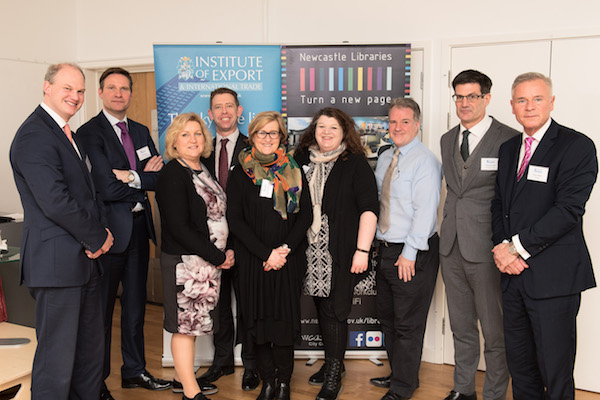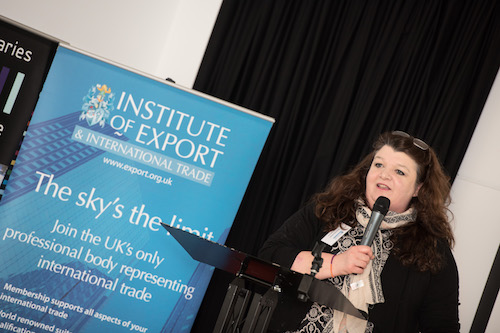
Photo credit: Laurence Sweeney Photography (c); @LRSPhotography
The Institute of Export & International Trade’s regional trade summit programme rebooted for 2018 in Newcastle on March 13th. The trade summits allow our members and other exporters in the regions to meet each other and exchange opinions and thoughts around best practice.
Optimism in the Northern Powerhouse
As ever, there was plenty of regional pride on show, and given the publicity around the government’s Northern Powerhouse project, plenty of ambition too. Ken Cuthbert and Simon Crosby from the Department for International Trade were both keen to point out that the region is among the UK’s highest performing when it comes to export.
Mr Crosby, a Senior International Trade Advisor, pointed out that the North East is the only region with a positive trade balance and suggested that exporting will continue to have an important economic importance for the region, as companies are 11% more likely to survive if they are exporters. Mr Cuthbert, the Senior Regional Operations Manager, was also keen to point out the massive potential for the region, given its 15 million strong population and £58.5 billion worth in exports. Updating the audience on the work being done by the Northern Powerhouse team in DIT, he pointed that the North of England is being pitched overseas as having the same economic power as London.
Help is on hand for the challenges ahead
However, as is always the case with our summits, there was plenty of ‘food for thought’ to go with the positivity around the opportunities in trade. Lesley Batchelor, the Director General of the Institute, opened proceedings with warnings about the potential impact of Brexit for exporters across the UK, including the north. She pointed out that the already complicatedly international nature of supply chains for the UK’s manufacturers is something that could become even more complicated and troublesome post-Brexit, given the potential additional customs requirements British companies could face.

Help is on hand though, with the speakers from DIT and Patrick Kendell, the senior Export Finance Manager at UK Export Finance, giving an overview of the government support on offer. Nicholas Clark, Regional Head of Trade and International for the North at summit sponsors Royal Bank of Scotland, presented on the different ways banks like RBS can support companies. He described financial solutions like letters of credit and invoice financing as ways for companies to mitigate the financial risks of exporting. Trevor Jackson, Business Development Manager at PD Ports – who run the major Teesside port and are themselves at the forefront of several Northern Powerhouse activities – gave an overview of how exporters can work with ports as well, to ensure they send their goods overseas compliantly and successfully.
Avoiding 'elephant traps'
Ahead of the summit we interviewed Liz Ward, principal of Virtuoso Legal, and Gareth Preece, a former DIT Skills advisor who now owns his own consultancy, and they both told us of the need to be proactive rather than reactive when it comes to planning an export strategy. Liz again presented on the need for companies to invest in getting the right contracts and IP protection in place before going out to market overseas. She spoke of the problems faced by companies who do not prepare for the potential “elephant traps” that come about by not investing properly in the legal side of exporting.

Gareth Preece’s presentation focussed on how companies need to have a coherent recruitment and training strategy in place to ensure they have the skilled employees needed for export success – and a plan for retaining them! He spoke about how companies should look at recruitment as a solution for when it’s harder to train internal staff in the skills needed, but spoke about growing and training the staff you already have as being of fundamental importance. He further pointed out that apprenticeships could be a particularly efficient and cost-effective solution to filling skills gaps in companies, making the point that the apprenticeship levy remains significantly underused by companies in the UK.
Special iApps share their exporter experiences

As ever, a highlight from the summit was being able to hear it all from an actual, ‘on-the-ground’ exporter. Beverley Dean, the Founder and President of Special iApps, who create learning apps for children with special educational needs, spoke about her experiences and, most importantly, some of her mistakes as she’s embarked on her own ‘roadmap to export success’. Special iApps have twice been runners up in the Open to Export Action Plan competitions and she spoke of her experiences using the Export Action Plan tool, as well as some of the support provided by DIT. She spoke about how Special iApps are an inherently international company through platforms like the Apple Store, and noted some of her inspiring experiences helping children far and wide – including Max in Russia – through the exported apps.
The summit as a whole once again showed the importance for government, industry and exporters to get together to share their experiences and thoughts around what’s happening in international trade and how best to seize the opportunities out there. Bev made the key point that there is definitely international demand for UK goods and services, noting how she received plenty of international attention at last year’s BETT show in London.
Through connecting with the industry support on hand and the hearing about best practice at events like the summits, British companies have wonderful opportunities to make the most of this international demand.
Don't forget to register for our Scottish World Trade Summit on 25th April, find out more here FREE for members and just £30+VAT for non-members.



